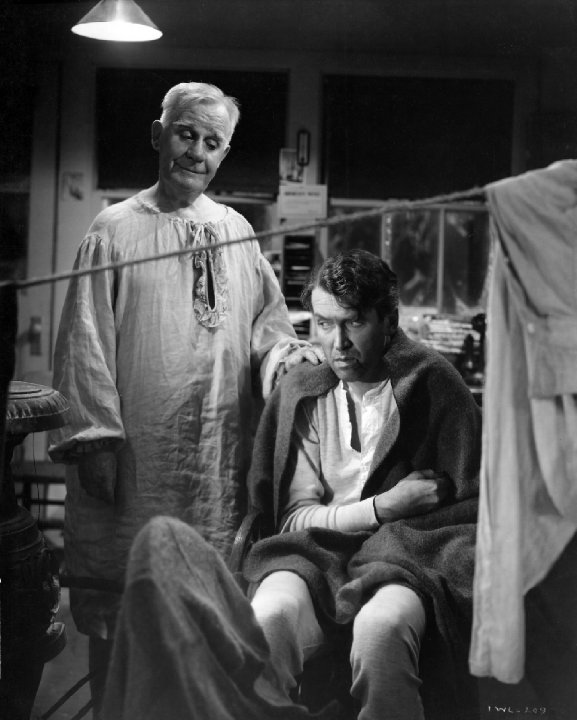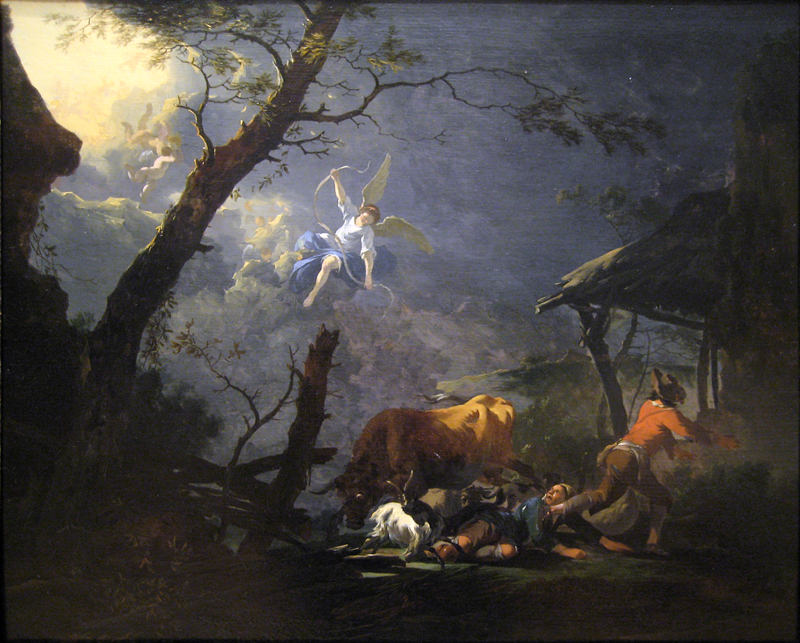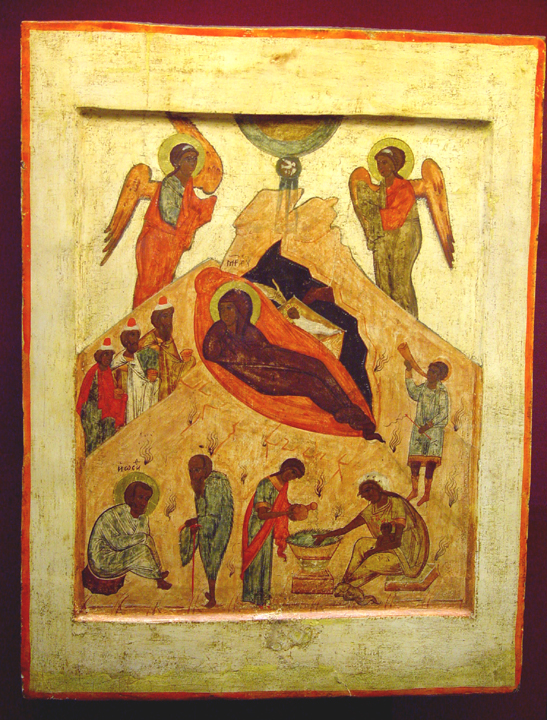This time of year in churches all over, little children dress up in white robes, put on wings and halos, and in general, look cute! Children dressed as angels are a staple of Christmas plays everywhere. Congregations voice their “Ahhhhs” and parents and family members hope that their “angels” behave themselves.
This is as it should be – angels do play a part in the Christmas story. Christmas pageants are stylized portrayals of the story of Jesus’ birth, and children dressed as angels fit right in. But we should, from time to time, stop and consider: what are angels?

And we are embarrassed by the kitschy angels sold in gift shops. Nothing this silly could possibly exist.

Various appearances of angels in scripture add weight to their fearsomeness. Consider the cherubim placed at the gateway to Eden with “a sword flaming and turning to guard the way to the tree of life” (Gen 3:24). Or when Elisha prays that his servant’s eyes be open and he sees “the mountain was full of horses and chariots of fire all around Elisha” (2 Kings 6:17).
We will do well to not speak lightly of these creatures! (For more about believing in angels, see Tish Harrison Warren’s post Angels We Ignore On High).
So here are a few things we should say about angels. First, they are messengers. Indeed that is the basic meaning of the word. Again and again angels bring a message. One of the more notable messages delivered is the one that Daniel receives:
He [the angel] said to me, “Do not fear, Daniel, for from the first day that you set your mind to gain understanding and to humble yourself before your God, your words have been heard, and I have come because of your words. (Daniel 10:12)
What really should get our attention is that we are called to be angels, that is, messengers of good news!
But how are they to call on one in whom they have not believed? And how are they to believe in one of whom they have never heard? And how are they to hear without someone to proclaim him? And how are they to proclaim him unless they are sent? As it is written, “How beautiful are the feet of those who bring good news! (Romans 10:14-15)
Second, angels are worshipers. We need look no further than here:
And suddenly there was with the angel a multitude of the heavenly host, praising God and saying, Glory to God in the highest heaven, and on earth peace among those whom he favors! (Luke 2:13-14)
Or that very evocative passage in Revelation:
And the four living creatures, each of them with six wings, are full of eyes all around and inside. Day and night without ceasing they sing, “Holy, holy, holy, the Lord God the Almighty, who was and is and is to come.” (Revelation 4:8)
Interesting that in Luke and in Revelation, it seems that the worship done by the angels lead people also to worship. Can we let ourselves, in the context of the academy, also get caught up in worship? Maybe the angels are showing *us* the way!
Finally, angels are warriors. This is very strange and not that clear. We note back in 2 Kings 6 that there is this army around Elisha, but they do not attack. Daniel 10 hints that some sort of battle is going on between the angel and a “prince of Persia” (much ink has been spilled guessing what this is all about; let’s not add to the guesswork). Jesus himself suggests that he could call an army of angels to fight for him (Matthew 26:53), but he does not call them. Instead he says, “Put up your swords.”
Angels fight, but they fight God’s way! Authors and songwriters have portrayed the angels as “in wonder” over the birth of Jesus. I’m not sure this is strictly fanciful. This show of weakness amazes us; why not the angels?
This is worth quoting:

Let the same mind be in you that was in Christ Jesus, who, though he was in the form of God, did not regard equality with God as something to be exploited, but emptied himself, taking the form of a slave, being born in human likeness. And being found in human form, he humbled himself and became obedient to the point of death – even death on a cross. Therefore God also highly exalted him and gave him the name that is above every name, so that at the name of Jesus every knee should bend, in heaven and on earth and under the earth, and every tongue should confess that Jesus Christ is Lord, to the glory of God the Father. (Philippians 2:5-11)
God fights by giving up power! God comes as a little baby, dependent on mother and father. This baby must flee tyrants, and then hide in a different location rather than going home. This baby will grow to be a man who suffers and cries, who is nailed to a cross and dies.
I submit that the primary way we are called to join in this fight is by our calling as scholars. This is incarnational – we fight by serving when and where God places us in the academy.
Maybe someday the angels will get the chance to show what they can do (I make no claim to understand the role the angels play in the “Last Days”). In the mean time, they play their (mostly) behind the scenes role “spirits in the divine service, sent to serve for the sake of those who are to inherit salvation” (Hebrews 1:14).
Let us then speak, worship, and fight, following the examples, and with the help of, the angels.
Thank-you to Charlie Claus for contributing ESN’s 2013 Advent series. Note: Earlier posts in the “Supporting Cast Members to the Christmas story” series focus upon the shepherds, the Magi,and Zechariah. For the Emerging Scholars Network’s growing Advent collection click here. May God richly bless you, your family, your friends, and your colleagues as you seek to follow Jesus the Christ (i.e., Messiah) with head, heart, and hands “in the flesh” this new year. To God be the glory! ~ Thomas B. Grosh IV, Associate Director of the Emerging Scholars Network
Charlie Clauss works with Intervarsity’s Graduate Student and Faculty Ministry in Minnesota and the Dakotas.

Leave a Reply